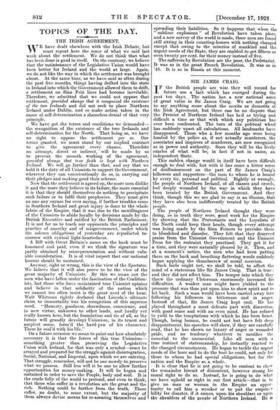TOPICS OF THE DAY.
THE IRISH AGREEMENT.
WE have dealt elsewhere with the Irish Debate, but must repeat here the sense of what we said last week about the settlement. We do not think that what has been done is good in itself. On the contrary, we believe that the maintenance of the Legislative Union would have been better for Ireland and the world at large. Again, we do not like the way in which the settlement was brought about. At the same time, as we have said so often during the past five months, things having drifted into the state in Ireland into which the Government allowed them to drift, a settlement on Sinn Fein lines had become inevitable. Therefore, we admitted that we could not oppose that settlement, provided always that it recognized the existence of the two Irelands and did not seek to place Northern Ireland under Dublin, and so make action taken in the name of self-determination a shameless denial of that very principle. We have got the terms and conditions we demanded— the recognition of the existence of the two Irelands and self-determination for the North. That being so, we have no right to oppose the settlement per se. Our terms granted, we must stand by our implied contract to give the agreement every chance. Therefdie no attempt, direct or indirect, will be made by us to prevent the smooth working of the agreement, provided always that true faith is kept with Northern Ireland. We will go further than that, and say that we hold it the duty of all Unionists to support the Government, wherever they can conscientiously, do so, in carrying out their pledges and making good their scheme.
Now that the settlement is agreed on, the more men dislike it and the more they believe in its failure, the more essential it is that they should themselves do nothing to precipitate such failure or to fulfil their prophecies. They must giie uo one any excuse for ever saying, if further troubles come in Southern Ireland and great injury is done to the whole fabric of the Empire, that it was due to the unwillingness of the Unionists to abide loyally by decisions made by the British Executive and ratified by the British Parliament. It is not for us to teach our opponents the principles and practice of anarchy and of misgovernment, under which the solemn obligations of yesterday arc repudiated to- morrow with cynical light-heartedness. A Bill with Great Britain's name on the back must be honoured and paid, even if we think the signature was partly obtained by misrepresentation and without valu- able consideration. It is of vital import that our national honour should be unstained.
Anyway, right or wrong, this is the view of the Spectator. We believe that it will also prove to be the view of the great majority of Unionists. By this we mean not the men who have fallen under the fascination of the Coalition- ists, but those who have maintained true Unionist opinion and believe in that solidarity of the nation which we cannot too often insist is the great need of the hour. Walt Whitman rightly declared that Lincoln's ultimate claim to immortality was his recognition of this supreme need. "Honesty, goodness, shrewdness, conscience, and (a new virtue, unknown to other lands, and hardly yet really known here, but the foundation and tic of all, as the future will grandly develop) Unionism, in its truest and amplest sense, form'd the hard-pan of his character. These he seed with his life."
On a future occasion we mean to point out how absolutely necessary it is that the forces of this true Unionism-- something greater than preserving the Legislative Union with Ireland, for that was only a symbol—must be arrayed and prepared for the struggle against disintegration, Social, National, and Imperial, upon which we are entering. That struggle, remember, will not be one merely to preserve what we possess. Still less will it be one to allow further opportunities for money-making. It will be begun and sustained in order to save the People, body and soul. It is the crude folly of the world to pretend, and even to think, that those who suffer in a revolution are the great and the rich. Nothing could be further from the truth. These suffer, no doubt, to some extent, but the majority of them always devise means for re-assuring themselves and spreading their liabilities. So it happens that when the sublime explosions " of Revolution have taken place, and a new survey of the world is made, these men are found still sitting in their counting-houses with nothing changed except that owing to the miseries of mankind and the urgent needs of the State, they are enabled to get fifteen or even twenty per cent. for their money instead of five. The sufferers by Revolution are the poor, the Proletariat. It was so in the great French Revolution. It was so in '48. It is so in Russia at this moment.






































 Previous page
Previous page